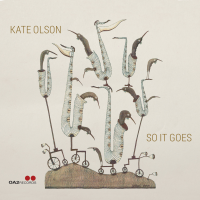Home » Jazz Articles » Interview » Dave Stapleton: Moving Edition Records With The Horizon
Dave Stapleton: Moving Edition Records With The Horizon

I try and delegate the things that I am not good at. I try and put my creative energies where I am best suited. My office is more of a creative space than a logistical space.
—Dave Stapleton, founder Edition Records
Chalk carvings, horses, weapons of mass destruction... and jazz. Few of Newbury's residents may know it, but the town is also home to Edition Records, one of the most progressive young record labels in contemporary jazz.
2023 marks the 15th anniversary of the label founded by keyboardist Dave Stapleton. In that time, Edition Records has grown from a cottage industry to a label of global renown (see Edition Records label profile), with artists such as Dave Holland, Verneri Pohjola, The Bad Plus, Chris Potter, Gretchen Parlato, Phronesis, Tineke Postma and Lionel Loueke among the many stars on its roster.
The story of Edition Records is an inspiring tale of DIY passion, ballsy opportunism and savvy entrepreneurship. For Stapleton, the journey is the thing.
Early Days...
Edition Record's beginnings, as in all epic tales, were humble ones."I started Edition with very little ambition, really, to release my own music and that of friends of mine," says Stapleton. "I never intended to grow a commercial business. It was about having an outlet to have some control and identity."
Stapleton's solo albums, plus releases by Bourne, Davis Kane, Mark Lockheart, Ivo Neame and Troyka made for a very solid start. As Stapleton sees it, each signing and subsequent release produced a kind of forward momentum.
"In the early days when we signed Troyka and Mark Lockheart, Ivo Neame and Phronesis, people began to email and ask if they could join the label. They were looking for something new and exciting. It's a tiny scene, everyone knows each other, especially in the management world. So, when they hear about one particular artist on a label that is doing things, suddenly they all want a piece of it."
In no time at all, the Edition Records roster was swelled by the arrival of emerging artists such as Marius Neset, Josh Arcoleo, Daniel Herskedal and Alexi Tuomarila.
Standout releases in the label's formative years included Phronesis' Alive (2010), Marius Neset's Golden Xplosion (2011), Mirrors (2013) by Kenny Wheeler, Norma Winstone and the London Vocal Project, and, in 2014, Tim Garland's Songs To The North Sky.
Twist Or Bust In The Digital Age
It was in 2014 that Stapleton was confronted by a major crossroads as regards Edition Records' viability. "I realized that I had to make the decision to do this properly or not at all," Stapleton recalls. "So, I decided to do it properly."Going all in, almost inevitably, meant personal sacrifices for Stapleton. "I stopped playing gigs so much, I stopped teaching and put everything into this full-time. Then I had to think: how do I grow this business? How do I grow a jazz label in the digital age?"
Edition Records came into being at the beginning of the audio-streaming Spotify era. In some ways, it was sink or swim.
"I embraced it," relates Stapleton. "I could see that the streaming thing wasn't going to go away." There was, he admits, "a lot of resistance" from some artists initially, but Stapleton could see the writing on the wall. "I thought, well, why not? It's going to be here in the future. We can't ignore it, so let's embrace it."
Stapleton's intuitive leap of faith onto the audio-streaming bandwagon was in keeping with one of the label's credos, "new music, new thinking."
For Stapleton, this means finding new ways to connect the dots between the progressive direction of the music, the means of production, distribution, promotion, and connecting artists with audiences. "It's almost redefining what a record label does these days."
The streaming platform took a while to bear fruit. "It didn't translate into any revenue for a long time," admits Stapleton, "but it is paying dividends now, in the sense that we are really benefiting from it. The digital side has grown a lot in the last two years. We are probably a 50% digital business, and that percentage will increase over the next few years, for sure."
Navigating The Pandemic
The COVID-19 pandemic brought about numerous difficulties, but on the face of it, Edition Records coped well. In 2020 the label produced 19 new releases. In 2021, 15 and in 2022, 18—healthy numbers by most yardsticks."Certainly, our direct business grew a huge amount," acknowledges Stapleton. "It almost quadrupled in 2020 compared to 2019. Part of that was because, as it happened, we built our new website and our own store in July 2020 and that was a big reason for that shift. But we also saw a big decline in retail that hit our sales. That has been the really big shift for us in the last three years. More people are buying direct, which is great—our profit margins are so much bigger."
During the pandemic Stapleton was the only staff member in the office, which posed logistical challenges. The large volume of orders was clearly a positive, but just packing the vinyl and posting it took the label's head honcho away from other duties.
"How could I run all the other aspects of the business and lead the team?" Stapleton reflects. "Now I have delegated that through a distribution partner, which is cheaper and more effective. I try and delegate the things that I am not good at. I try and put my creative energies where I am best suited. My office is more of a creative space than a logistical space."
Besides CDs and digital formats, Edition Record releases are also available in striking colored vinyl. Though some would say that vinyl never actually went away, it has enjoyed a resurgence in popularity in recent years. For Stapleton, it makes perfect sense.
"People like ownership of something tangible. It is something really personal to them. I think it is also the retro, nostalgic thing of having a collection, because that is really missed with streaming. You may have a whole digital music library, but you have no ownership of that. There is a sense of identity through a collection, and that is a significant thing. You can follow the arc of your whole journey of musical discovery through a collection, and that journey is not as exciting on streaming platforms."
The Rough With The Smooth
Running Edition Records has been something of a double-edged sword for Stapleton as regards his own career as a solo artist and as a member of Slowly Rolling Camera."I haven't dedicated enough time to my music in recent years," he admits.
The flip flip side is that he can call on some pretty spectacular guest musicians whenever he does make a record. Slowly Rolling Camera's album Where The Streets Lead (2021) featured Mark Lockheart, Jasper Høiby, Potter, Pohjola and Sachal Vasandani.
Finnish trumpet Pohjola has been a notable signing for Edition Records. His albums Bullhorn (2015) and The Dead Don't Dream (2021) are little short of masterpieces.
"He is something special," agrees Stapleton. "He's got this spectrum of being able to play with great emotion but also to really lay into the music—he's really got it all. He's an amazing musician."
American Adventures
So too Chris Potter, whose first album with Edition Records was 2019's Circuits. Bringing arguably jazz's greatest living tenor saxophonist onto the label was a real coup. Other big-name Americans soon followed: The Bad Plus; Kurt Elling; Parlato; Nate Smith; Jeff Ballard; Mark Guiliana; Donny McCaslin.These artists have doubtless helped raise Edition Record's international profile, but they have also posed different sorts of challenges for the label.
"Within the space of a year, a year and a half of signing Chris Potter our roster had suddenly taken on a lot of Americans. And it's hard, because it comes with a change in work, a time-zone difference, different expectations, a different way of working, and of seeing the world, how to manage the existing roster—that has all been happening in the last three years."
Diversity, Inclusion, Expansion
As Edition Records has grown, its stylistic base has broadened, welcoming such singular artists as Snowpoet, built around the duo of singer Lauren Kinsella and bassist/keyboardist Chris Hyson . Norwegian tubaist Herskedal and Swedish singer-songwriter Frida Touray have brought other, highly distinctive flavors."The diversity of our roster is an important aspect to us," says Stapleton. "In our early days I was living in Cardiff, and you signed people around you, similar people to me then. To create diversity takes time, you can't do it overnight. I don't want to do it to tick boxes. I want to do it authentically."
With the broadening of the label's roster and the growth in digital sales, Stapleton saw an opportunity for a subsidiary label, E2.
"E2 is more emotive, electronic, mood-orientated music. I had a love of electronic, ambient music almost before I got into jazz. It's fun and it allows us to do different projects that don't want to be too pigeonholed into being a jazz project. If an artist is on E2 it invites a different audience and opens up other opportunities for them. It gives us a little bit more flexibility in putting the right projects in the right place, rather than confusing what Edition Records is, which is a contemporary jazz label."
Edition Records Artwork
Both Edition Records and E2 boast highly original artwork, though no two album covers are the same. In the label's early days Stapleton indulged his love of photography in crafting the album's artwork, a strategy that was also driven by the need to keep costs down. In 2018, he brought designer Oli Bentley on board. "He came in with this kind of vision of what a jazz label could be," says Stapleton."These are the musicians' albums; they are not our albums. It was about finding a story that enhances the record, which is of quality and that goes with the identity of the artist—that was very clear."
The Edition Records logo, small yet distinctive, usually sits to one side of an album's cover.
"It's subtle, it's saying we're here, but it's not the centre of the cover art. We are not intrusive. We are supportive," insists Stapleton.
"What I've learnt with the artwork is to trust the people who really know what they are doing. Oli knows he has full control in what goes on those covers. He has done some incredible covers. He's really got an eye for it. He's also very compassionate, very understanding, very empathetic and he won't compromise for the sake of something—that is the real mark of a craftsman."
Growing An Arts Organisation
Looking at Edition Records' catalogue of over 200 albums and the stellar names attached to them, it might be tempting to conclude that the label's journey has been a smooth one. Stapleton is quick to dispel any such notion."It has not been a walk in the park. There have been some very difficult times, dealing with the changes in the industry, working out how to service these albums without spending a load of money on them—that has been one of the greatest challenges. But you get through them," Stapleton affirms.
"It's been a challenge but at each stage there is always something on the horizon that makes me think, I'll just stick with this a little bit longer and see where it goes, and that may be a new signing or a possible distribution deal... You just fight through and talk to enough people to get you through that. "It's been a huge learning experience, a real case study in growing an arts organization."
Music may be the Edition Record product, but at every step of the process people are integral to the running of the business. Building relationships is an essential part of the equation.
"We're talking to agents, we're talking to publicists, we're talking to artists, we're talking to distribution, we're talking to media," says Stapleton, somewhat breathlessly. "The label is kind of situated in the middle of the industry. As a result, we get to have a lot of different conversations with a lot of different people, and it provides a very interesting perspective about the whole industry. It's about dealing with people and making the right decisions to get what you need."
Qualifying Success
In a difficult, competitive market, Edition Records has emerged as a tremendous success story. For Stapleton, however, notions such as growth and success are relative concepts."You can get carried away by all the metrics that surround it; like, what does success mean? What does growth mean? You could say making a 20% profit margin is success, but at what cost?" he asks, rhetorically.
"Success for me, personally, is being privileged enough to have a business that I control and own, that I can make decisions on, to work with people who are amazing, to come to work every day surrounded by keyboards and talk to interesting people and be creative. Growth doesn't have to be defined by more releases and more money. Growth can be fewer releases done better."
Balancing Art And Commerce
One of Edition records earliest releases was Live at Le Mans, (2009) an archival recording from 1998 of legendary English pianist Keith Tippett's Tappestry Orchestra. "I started in free music," says Stapleton. "Keith Tippett was the guy who really got me into the music. I was so into free improvised music, but when you start running a business you get this conflict between art and commerce, because free music doesn't make any money. It has slightly pulled me away from that," he concedes."It's trying to find the balance between art and commerce. If it was just about commercial music I wouldn't be doing any of this, I would be doing something that was guaranteed to make as much money as possible," Stapleton reasons.
"It is a spectrum. I started right on the free side, and I am probably somewhere in the middle now, though I still get passionate about the progressive end of the music. "
Looking Ahead
After 15 years, Stapleton remains as committed to the music as ever, though wisely he refuses to second guess the future."The vision is still there, but you never really get to a destination—it's always changing. It's like if you're in a boat and you're looking at the horizon, you never get to the horizon, it moves with you."
Stapleton's horizon has certainly moved as Edition Records has advanced in years. It must be hugely satisfying to see how his label has gone from providing a recording outlet for a few mates in Cardiff, to releasing albums like Chris Potter's Got The Keys To The Kingdom (2023), recorded at New York's fabled Village Vanguard—for many, the Mecca of jazz.
"I do have to pinch myself at times," says Stapleton. "I remember driving around Cardiff, teaching, between lessons, aged 22, listening to Dave Holland's quintet with Chris, and his album Traveling Mercies and being really influenced by his writing and the sound he was getting. Now having released four of his albums... " He pauses, as though weighing his thoughts and emotions. ... "it's incredible, and I feel there's a long way to go on the journey."
Where does Stapleton see himself and Edition Records 15 years hence?
"I'll be almost sixty then. My vision would be me taking a slight step back in the running of the day to day, still being involved in the creative side perhaps, but having a slightly bigger team around me. Ultimately, I want to carry on being creative, collaborating with amazing people and doing that in a sustainable way.
"Really, that's the goal here. It's not about making a multi-million-pound business, it's about how can we sustain ourselves in a very changeable, challenging world and doing the things that fulfil us."
Tags
Interview
Dave Holland
Ian Patterson
Verneri Pohjola
The Bad Plus
Chris Potter
Phronesis
Tineke Postma
Lionel Loueke
Mark Lockheart
Ivo Neame
Troyka
marius neset
Josh Arcoleo
Daniel Herskedal
Alexi Tuomarila
Kenny Wheeler
norma winstone
Tim Garland
Slowly Rolling Camera
Jasper Høiby
Kurt Elling
Nate Smith
Jeff Ballard
Mark Guiliana
Donny McCaslin
Snowpoet
lauren kinsella
Chris Hyson
Keith Tippett
PREVIOUS / NEXT
Dave Holland Concerts
Support All About Jazz
 All About Jazz has been a pillar of jazz since 1995, championing it as an art form and, more importantly, supporting the musicians who make it. Our enduring commitment has made "AAJ" one of the most culturally important websites of its kind, read by hundreds of thousands of fans, musicians and industry figures every month.
All About Jazz has been a pillar of jazz since 1995, championing it as an art form and, more importantly, supporting the musicians who make it. Our enduring commitment has made "AAJ" one of the most culturally important websites of its kind, read by hundreds of thousands of fans, musicians and industry figures every month.


























